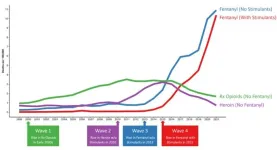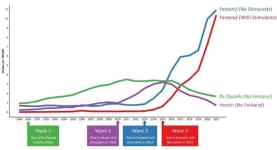(Press-News.org) When people feel that their resources are scarce – that they don’t have enough money or time to meet their needs – they often make decisions that favor short-term gains over long-term benefits. Because of that, researchers have argued that scarcity pushes people to make myopic, impulsive decisions. But a study published by the American Psychological Association provides support for a different, less widely held view: People experiencing scarcity make reasonable decisions based on their circumstances, and only prioritize short-term benefits over long-term gains when scarcity threatens their more immediate needs.
“This research challenges the predominant view that when people feel poor or live in poverty, they become impatient and shortsighted and can’t or don’t think about the future,” said study co-author Eesha Sharma, Ph.D., of San Diego State University. “It provides a framework, instead, for understanding that when people are experiencing financial scarcity, they’re trying to make the best decision they can, given the circumstances they’re in.”
The research was published in the Journal of Personality and Social Psychology.
Sharma and co-authors Stephanie Tully, Ph.D., of the University of Southern California, and Xiang Wang, Ph.D., of Lingnan University in Hong Kong, wanted to distinguish between two competing ideas: That people’s preference for shorter-term gains reflects impatience and impulsivity, or that it reflects more intentional, deliberate decision-making. To do so, they examined how people’s decisions change depending on the timeline of the needs that they feel they don’t have enough money for.
“Needs exist across a broad time horizon,” said Tully. “We often think about immediate needs like food or shelter, but people can experience scarcity related to future needs, too, such as replacing a run-down car before it dies, buying a house or paying for college. Yet research on scarcity has focused almost exclusively on immediate needs.”
In the current study, the researchers conducted five experiments in which they measured or induced a sense of scarcity in participants, and examined how the choices people made changed depending on whether that scarcity was related to a shorter- or longer-term need.
Overall, they found that when people feel that they don’t have enough resources to meet an immediate need, such as food or shelter, they are more likely to make decisions that offer an immediate payout, even if it comes at the expense of receiving a larger payout later. But when scarcity threatens a longer-term need, such as replacing a run-down car, people experiencing scarcity are no less willing to wait for larger, later rewards -- and in some cases are more willing to wait -- compared with people not experiencing scarcity.
In one experiment, for example, the researchers identified more than 1000 participants via Facebook ads who were planning a wedding. For some, they induced a sense of scarcity by asking whether wedding planning ever made them feel as though they didn’t have enough money, and what part of the wedding cost they were most concerned about. A control group was asked to reflect on the part of their wedding they were most excited about.
Next, participants were told they’d be entered into a lottery to win a cash prize: $200 immediately or $300 several months later. The researchers found that on average, participants in the scarcity group were not significantly more likely to choose the immediate payout than those in the control group, suggesting that scarcity, on its own, did not cause greater impatience. But when they examined participants’ choices through the lens of wedding dates, they found scarcity did affect preferences. When the participants’ wedding dates were before the payout date of the larger prize (a shorter time horizon), participants were more likely to choose the smaller, sooner payout, but when participants’ wedding dates were after the payout of the larger prize (a longer time horizon), they were more likely to choose the larger, later payout.
In a follow-up experiment, the researchers found that the time horizon effect only influenced participants’ choices when the payout was relevant to the threatened need, suggesting that the decisions reflected participants’ deliberate attempts to meet the threatened need. In other words, when participants felt short on money for an immediate need, they were more likely to choose a smaller, quicker cash payout, compared with when they felt short on money for a long-term need. But when they were made to feel short on time rather than money, then whether the need was immediate or long term didn’t affect whether they chose a small, quick cash payout or a larger, later one.
The research is relevant to decision-making for almost everyone, not just those who are living in poverty, according to Sharma. “A lot of people talk about financial scarcity as though it is interchangeable with poverty,” she said. “But the experience of feeling that your resources are inadequate is almost universal -- it’s something everyone can relate to, because at some point in your life, you’ve probably felt you don’t have enough money.”
The results also have implications for what types of interventions are likely to help people make better long-term decisions about everything from personal finances to climate change, according to Wang.
“Understanding experiences of scarcity is critical, particularly as factors in society -- climate change affecting water and food supplies, inflation impacting cost of living and more targeted forms of advertising increasingly manufacture perceived needs -- produce never-ending triggers of perceived scarcity,” she said.
ARTICLE: “Scarcity and Intertemporal Choice,” by Eesha Sharma, Ph.D., San Diego State University; Stephanie M. Tully, Ph.D., University of Southern California; and Xiang Wang, Ph.D., Lingnan University. Journal of Personality and Social Psychology, published online Sept. 14, 2023.
CONTACT: Eesha Sharma can be reached at esharma@sdsu.edu.
END
Take the money now or later? Financial scarcity doesn’t lead to poor decision making
When people feel their resources are scarce, they make reasonable decisions to meet their most important needs, study finds
2023-09-14
ELSE PRESS RELEASES FROM THIS DATE:
Researchers make strides in harnessing low-grade heat for efficient energy conversion
2023-09-14
A team of researchers, jointly led by Professor Hyun-Wook Lee and Professor Dong-Hwa Seo from the School of Energy and Chemical Engineering at the Ulsan National Institute of Science and Technology (UNIST), in collaboration with Professor Seok Woo Lee from Nanyang Technological University in Singapore, has achieved significant breakthroughs in harnessing low-grade heat sources (<100 °C) for efficient energy conversion. Their groundbreaking work focuses on developing a highly efficient Thermally Regenerative Electrochemical Cycle (TREC) system capable of converting small temperature differences into usable energy.
Conventional energy-harvesting ...
New $50 million institute aims to use the power of math to model, predict biological processes
2023-09-14
Building a mathematics-based understanding of biology at all scales of life — from individual cells to interactions between species — is the goal of a new $50 million institute supported by the U.S. National Science Foundation in partnership with the Simons Foundation. The two organizations are each providing $25 million to launch the National Institute for Theory and Mathematics in Biology (NITMB). The institute will bring together experts across the mathematical and biological sciences to explore research challenges related to a broad range of topics and industries, such as the environment, biomedicine and biotechnology.
The institute will be led by Northwestern University ...
Preventing ground collapse through new AI-based monitoring
2023-09-14
As severe urban overcrowding is trending worldwide many underground development projects are being carried out in metropolitan centers worldwide. South Korea has experienced problems such as aging underground facilities and inaccurate information management due to rapid urban development since the 1970s and 1980s. Accident prevention has become a major challenge since accidents in underground spaces have occurred due to various causes.
The Korean government is undertaking projects to digitize underground facilities and ground information and establish a 3D underground space information database to prevent ...
Nation’s first dual degree in medicine and AI aims to prepare the next generation of health care providers
2023-09-14
The Joe R. and Teresa Lozano Long School of Medicine at The University of Texas Health Science Center at San Antonio (UT Health San Antonio) and the University College at The University of Texas at San Antonio (UTSA) are officially launching the first known program in the United States to combine medicine and artificial intelligence. A Doctor of Medicine (MD) from UT Health San Antonio and a Master of Science in Artificial Intelligence (MSAI) from UTSA will form a five-year MD/MS program enabling physicians trained in San Antonio to uniquely lead in the practical use of artificial intelligence to improve diagnostic and treatment ...
Worse results and more drop-outs when teaching is in English
2023-09-14
Using English as the language of instruction in higher education has a marked negative impact on learning outcomes when it is not the students’ first language, according to a new study from KTH Royal Institute of Technology and Chalmers University of Technology in Sweden. When 2,000 Swedish students were divided up into English-language and Swedish-language versions of an introductory course in programming, those students who were taught in English obtained much worse results, and more dropped out of the course prematurely.
English is increasingly used as a global language of instruction in higher education, known as English Medium Instruction or ...
Lack of maternal care affects development, microbiome and health of wild bees
2023-09-14
TORONTO, Sept. 14, 2023 – Most wild bees are solitary, but one tiny species of carpenter bees fastidiously cares for and raises their offspring, an act that translates into huge benefits to the developing bee’s microbiome, development and health, found York University researchers.
Not unlike the positive affect human mothers can have on their offspring, the maternal care of these carpenter bees (Ceratina calcarata) staves off an overabundance of harmful fungi, bacteria, viruses and parasites in the earliest stage of development.
Without maternal care the pathogen load of these ...
Pollination by more than one bee species improves cherry harvest
2023-09-14
To obtain the biggest cherry harvest, trees should be pollinated by both honey bees and mason bees. A new study led by a researcher at the University of Gothenburg shows yet another benefit of biodiversity.
Like many other fruit trees, most sweet cherry cultivars depend on cross-pollination to produce their fruit. This means that there need to be several different cultivars of sweet cherry trees in an orchard for the bees to transport pollen from one to another.
“Sweet cherry trees are usually planted in alternate rows of different cultivars. In some cases, you can put different cultivars in the same row, but ...
New foresight report identifies urgent policy actions needed to put SDGs back on track
2023-09-14
Ahead of the UN’s SDG Summit (18-19 September), Earth4All, an international team of economists and scientists, and the Foundation for European Progressive Studies (FEPS), unveil groundbreaking research showing that policymakers can ensure the implementation of SDGs by 2050. The report ‘SDGs for All: Strategic scenarios’ equips policymakers with practical solutions designed to accelerate SDG implementation and to respond to the planetary emergency. It concludes that policymakers can step up the implementation of the SDGs by 2030 and beyond ...
The fourth wave of the US overdose crisis: fentanyl and stimulants
2023-09-14
New research published in the scientific journal Addiction has found that the proportion of US overdose deaths involving both fentanyl and stimulants has increased more than 50-fold since 2010, from 0.6% (235 deaths) in 2010 to 32.3% (34,429 deaths) in 2021. By 2021, stimulants (such as cocaine and methamphetamine) had become the most common drug class found in fentanyl-involved overdoses in every US state. This rise in fentanyl/stimulant fatalities constitutes the ‘fourth wave’ in the US’s ...
Overdose deaths from fentanyl laced stimulants have risen 50-fold since 2010
2023-09-14
New UCLA-led research has found that the proportion of US overdose deaths involving both fentanyl and stimulants has increased more than 50-fold since 2010, from 0.6% (235 deaths) in 2010 to 32.3% (34,429 deaths) in 2021.
By 2021, stimulants such as cocaine and methamphetamine had become the most common drug class found in fentanyl-involved overdoses in every US state. This rise in fentanyl/stimulant fatalities constitutes the ‘fourth wave’ in the US’s long-running opioid overdose crisis –the death toll of which continues to rise precipitously.
“We’re now seeing ...
LAST 30 PRESS RELEASES:
New “lock-and-key” chemistry
Benzodiazepine use declines across the U.S., led by reductions in older adults
How recycled sewage could make the moon or Mars suitable for growing crops
Don’t Panic: ‘Humanity’s Last Exam’ has begun
A robust new telecom qubit in silicon
Vertebrate paleontology has a numbers problem. Computer vision can help
Reinforced enzyme expression drives high production of durable lactate-based polyester
In Rett syndrome, leaky brain blood vessels traced to microRNA
Scientists sharpen genetic maps to help pinpoint DNA changes that influence human health traits and disease risk
AI, monkey brains, and the virtue of small thinking
Firearm mortality and equitable access to trauma care in Chicago
Worldwide radiation dose in coronary artery disease diagnostic imaging
Heat and pregnancy
Superagers’ brains have a ‘resilience signature,’ and it’s all about neuron growth
New research sheds light on why eczema so often begins in childhood
Small models, big insights into vision
Finding new ways to kill bacteria
An endangered natural pharmacy hidden in coral reefs
The Frontiers of Knowledge Award goes to Charles Manski for incorporating uncertainty into economic research and its application to public policy analysis
Walter Koroshetz joins Dana Foundation as senior advisor
Next-generation CAR-T designs that could transform cancer treatment
As health care goes digital, patients are being left behind
A clinicopathologic analysis of 740 endometrial polyps: risk of premalignant changes and malignancy
Gibson Oncology, NIH to begin Phase 2 trials of LMP744 for treatment of first-time recurrent glioblastoma
Researchers develop a high-efficiency photocatalyst using iron instead of rare metals
Study finds no evidence of persistent tick-borne infection in people who link chronic illness to ticks
New system tracks blockchain money laundering faster and more accurately
In vitro antibacterial activity of crude extracts from Tithonia diversifolia (asteraceae) and Solanum torvum (solanaceae) against selected shigella species
Qiliang (Andy) Ding, PhD, named recipient of the 2026 ACMG Foundation Rising Scholar Trainee Award
Heat-free gas sensing: LED-driven electronic nose technology enhances multi-gas detection
[Press-News.org] Take the money now or later? Financial scarcity doesn’t lead to poor decision makingWhen people feel their resources are scarce, they make reasonable decisions to meet their most important needs, study finds








